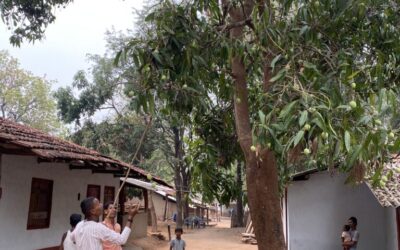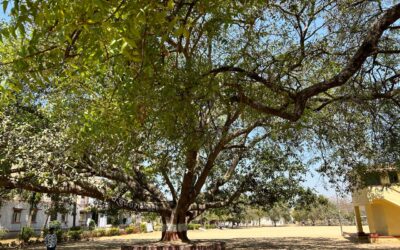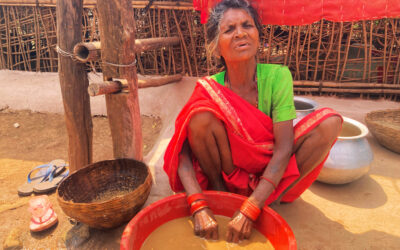It’s a sunny day in October, my silver-colored pair of sandals are sparkling as the sunlight reflects against it. I am walking around a village unknown, in a rural part of South Rajasthan that is located miles and miles away from home. My friend and I are looking for a shade to sit under, with only one objective in mind – we have to complete a task; we need to talk to a stranger. My eyes are searching for that one person who would accept me enough to answer a few questions thrown at them in my broken Hindi.
I come from a metropolitan city, I cut my hair short like a ten-year-old boy, nose pierced on the right, I hang a pair of sunglasses from my kurta, all of which makes me who I am, and does not say who I am not.
We find the stranger we so desired to discover, sitting with his friend under the shade of a newly built temple. A pair of old men with a curious look on their faces would generally drive me away from the place. This time though, I had promised that I would prioritize the task over my insecurities, inhibitions, and fears. My friend is from Bombay, speaks fluently in the language that apparently unites this country, or rather, it is the medium of the biggest factor of unity – Bollywood; a place that provides all sorts of stories about places and spaces across borders, oftentimes a single narrative, carrying one single notion.
I sit on the steps of the temple, my friend sits opposite to me. We both are now both looking up at the old men who have graciously agreed to give us some of their time. The interview begins with introductions, ours, not theirs (the interesting point to note here would be that we wanted them to know where we come from and what purpose we have of visiting them, but it never occurred to us to know who they were). I feel conscious of my appearance and hear the voice that is speaking from the back of my mind. Focus, I say to myself, it is about them, not you. One of them gets up and starts to leave. I notice his frail back moving away from us, that shows who he is, that shows who I think he is. The other man, who would now dedicate more time to us than he originally planned, goes on to discuss agriculture, his main source of livelihoods.
As he is talking about the seasonal rotation of his cropping patterns, I carefully observe the colorful turban he wears, tied neatly across his forehead, the metal bangle on his right arm that looks like it is cleaned on a regular basis. The white kurta and dhoti have some amount of dirt on them, just enough to show that he comes from the field, but not enough to be considered dirty.
I realize how less I know about the life of my interviewee and what he does, which is growing crops on his field every single day for the past five or six decades. He existed before the nation became independent; he believes it to have achieved the status in January of 1947, and I decide to not hold it against him. The reality is that there is always a possibility of him not knowing such facts, and to him it could be as trivial as wearing cologne is to me. For now, both of us are existing in this space, completely different from each other. I know nothing of his worldview, he knows nothing of mine and yet, we are a part of a conversation. I know that in hindsight, I would think of more intelligent questions that I am not asking him right now and it bothers me. He, on the other hand, shows no signs of discomfort and goes on to talk about various kinds of crops. I know that I’m going to forget half of the terms mentioned by him.
A passer-by comments on a few aspects of the conversation but doesn’t actively engage in it. I pause for a moment and bring myself out of the interview for a while to observe around. My friend is speaking to him animatedly, the soft light of the day (by now the sun is starting to set) reaches her earrings that are dangling against her neck. They sparkle, just like my sandals. I look at the old man again; he also sparkles but in a different manner. It is the sparkle of his eyes that captures my attention when he talks about how he makes food for himself. It is the sparkle of his toothless smile when he speaks about certain village festivals he takes part in. Suddenly there is a loud noise. I’m snatched out of my thought bubble and brought back to the present. He continues with his story, casually remarking on how little children playing around us are bursting crackers in the middle of the day just because they want to. I take a deep breath and decide to dive deep into myself now.
Do my eyes sparkle like that when I speak? Are my pupils dilated when I tell my stories? What is it about this strange stranger in this strange place that seems stranger by the minute that is taking a hold of me? I decided to find out more.
Looking down at my notepad, the words are starting to align themselves in front of me. I have a story. My friend looks at me, satisfied. I check the time, we have to get going now. As we take leave, our backs turned towards the old man, I wonder, do they tell him who we are!




You know that you write well, right? Totally enjoyed reading this one specially how you have mixed what’s happening with what’s going on in your head.
Thank you, Swati! You’re awesome ❤
Thank you, Swati! You’re awesome ❤
Good style.
Thank you, Nikhil 🙂
Thank you, Nikhil 🙂